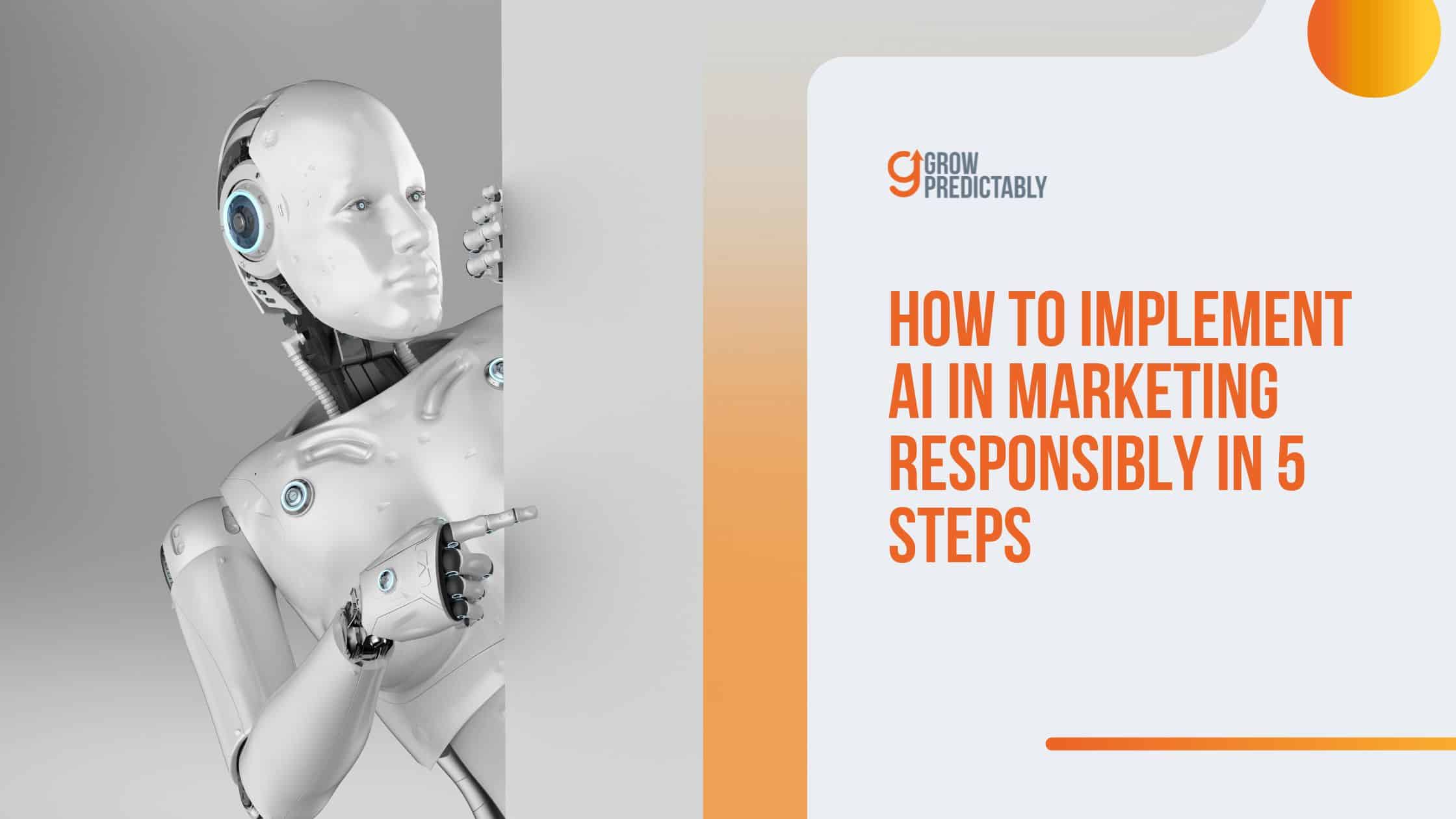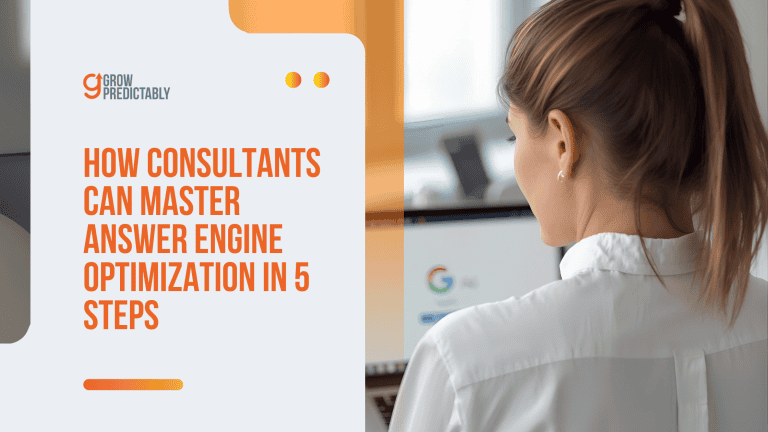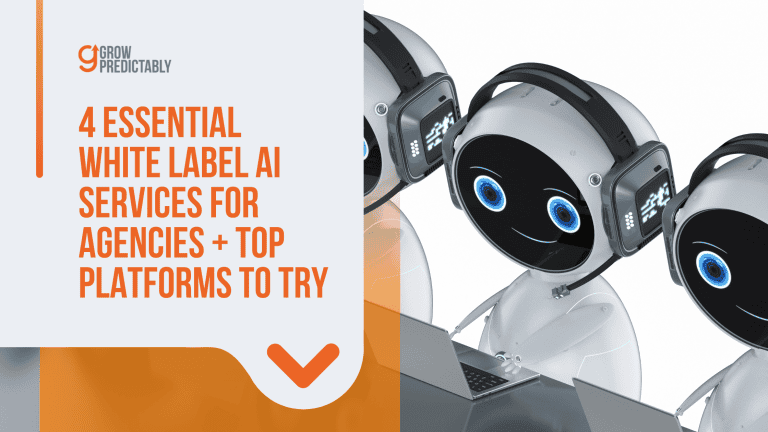How to Implement AI in Marketing Responsibly in 5 Steps
Everyone’s talking about AI transforming marketing.
But here’s the uncomfortable truth: most brands implement it recklessly.
When AI overshoots its boundaries, lawsuits, fines, and angry customers follow.
The upside?
Done right, it builds loyalty, credibility, and long-term growth.
Wondering how to implement AI in marketing responsibly?
Let’s dig into the details.
Understanding AI in Marketing

Marketing has evolved beyond human intuition and basic analytics.
AI in marketing is the powerhouse that transforms raw customer data into revenue-generating insights.
Different AI models contribute to this transformation by processing and analyzing vast amounts of data to uncover actionable insights.
It’s the technology that enables you to make decisions based on patterns your human brain could never process in real-time.
AI technologies also play a crucial role in enhancing customer experience and trust through ethical data practices and advanced AI chatbots.
The implementation of AI has become the defining factor between businesses that scale and those that stagnate.
- AI-powered systems process billions of customer interactions daily, creating dynamic customer profiles that evolve with each touchpoint, allowing you to serve exactly what your customer needs before they even know they need it
- Machine learning algorithms continually refine your marketing campaigns by analyzing engagement patterns across all channels – email, social, web, and mobile – giving you a unified view of campaign performance that updates in real-time
- Natural Language Processing (NLP) systems analyze customer communications across support tickets, social media mentions, and reviews to identify sentiment patterns and emerging issues, enabling proactive response strategies
- Predictive analytics leverages historical data to forecast customer lifetime value, churn probability, and optimal pricing points with 89% accuracy according to MIT research
The implementation of AI in marketing isn’t just about automation – it’s about amplification of your existing marketing efforts and unlocking growth opportunities that would be impossible to identify manually.
Benefits and Risks of AI in Marketing
The integration of AI in marketing creates a clear divide between businesses operating on outdated systems and those leveraging AI to dominate their market.
However, this technological advantage comes with both massive opportunities and significant responsibilities.
- ROI Acceleration: AI-driven personalization has shown to increase marketing ROI by 42% according to Salesforce’s State of Marketing Report, while reducing customer acquisition costs by up to 50%
- Resource Optimization: Marketing teams using AI report spending 37% less time on manual data analysis and 47% more time on strategic initiatives that drive growth
- Customer Intelligence: AI systems can process and analyze customer behavior patterns across 15+ touch points simultaneously, creating detailed customer journey maps that would take teams of analysts months to compile manually
However, the risks are equally significant and require careful consideration:
- Data Privacy Compliance: With regulations like GDPR and CCPA, mishandling customer data through AI systems can result in fines up to €20 million or 4% of global revenue
- Algorithm Transparency: Companies must invest in explainable AI systems to maintain trust and comply with emerging regulations requiring transparency in automated decision-making
- Implementation Costs: Initial AI integration requires significant investment in both technology and talent, with enterprise-level solutions ranging from $100,000 to $300,000 according to Gartner’s Marketing Technology Survey

Additionally, ethical concerns related to AI in marketing, such as potential brand damage and compliance issues, must be addressed to ensure responsible use and positive outcomes.
The key to successful AI implementation in marketing isn’t just about having the technology – it’s about having a clear strategy for how AI will amplify your existing marketing efforts and drive measurable business results.
Every risk must be weighed against potential returns, and every implementation must be measured against concrete business objectives.
The Importance of Responsible AI in Marketing
The difference between market leaders and failures often comes down to how they handle AI implementation.
Responsible AI isn’t just an ethical choice – it’s a business imperative that directly impacts your bottom line.
In today’s market, customers don’t just buy your product; they buy into your data practices and ethical standards.
Ethical AI practices play a crucial role in ensuring responsible AI implementation in marketing, helping brands navigate potential risks and ethical dilemmas responsibly.
- Advanced AI systems can process over 1 million customer interactions per minute, making ethical data handling not just a compliance issue but a fundamental business practice that 83% of consumers consider before engaging with a brand according to Deloitte
- Implementing responsible AI practices has shown to increase customer lifetime value by 27% according to the Harvard Business Review, primarily through enhanced trust and improved service personalization
- Transparent AI systems that provide clear explanations for their decisions have demonstrated a 35% higher customer satisfaction rate according to Accenture’s research
- Regular algorithmic audits and bias testing protocols have proven to increase marketing campaign effectiveness by identifying and eliminating prejudiced patterns that could alienate customer segments
The implementation of responsible AI creates a foundation of trust that transforms one-time buyers into brand advocates and critics into supporters.
Consequences of Irresponsible AI Usage
The cost of cutting corners with AI implementation isn’t just measured in dollars – it’s measured in lost market share, damaged reputations, and extinct brands.
Upholding ethical standards is crucial to prevent the negative consequences of irresponsible AI usage, such as brand damage and loss of consumer trust.
The market punishes irresponsible AI usage with unprecedented speed and severity.
- Financial Impact: Companies facing AI-related privacy breaches have experienced average stock price drops of 7.5% according to PwC’s Digital Trust Insights, with recovery periods extending beyond 12 months
- Regulatory Penalties: Non-compliant AI practices have resulted in fines reaching up to 4% of global annual revenue under GDPR, with the average penalty exceeding €15 million for serious violations
- Brand Damage: Organizations found misusing AI for customer manipulation have seen customer churn rates increase by up to 41% according to McKinsey’s Trust in AI report
- Market Value: Companies involved in AI ethics scandals have experienced average market cap reductions of $4.5 billion within the first week of public discovery
The implementation of irresponsible AI creates a domino effect: lost trust leads to lost customers, lost customers lead to lost revenue, and lost revenue leads to lost market position.
Recovery from AI ethics violations typically requires 3-5 years of intentional rebuilding of customer trust and brand reputation.
Building responsible AI systems requires more initial investment, more rigorous testing, and more careful implementation.
But the alternative – facing the consequences of irresponsible AI usage – costs exponentially more in both financial and reputational damage.
Every decision in AI implementation must be weighed against its long-term impact on customer trust and brand value.
5 Steps How to Implement AI in Marketing Responsibly
Implementing AI in marketing isn’t just about deploying the latest technology – it’s about creating sustainable competitive advantages while upholding the highest ethical standards.
According to McKinsey’s 2023 State of AI report, companies that implement AI responsibly see 32% higher customer retention rates and 28% stronger brand loyalty compared to those that rush implementation without proper safeguards.
The difference between success and failure in AI marketing implementation often comes down to the systematic approach you take in these five critical areas.

1. Define Clear Objectives and Ethical Guidelines
Every successful AI implementation starts with a bulletproof framework of objectives and ethical guidelines.
Random implementation of AI tools without clear objectives burns through resources and creates compliance nightmares that can devastate your business.
Your framework must serve as both a strategic compass and an ethical guardrail. Ethical marketing practices are crucial in aligning marketing strategies with corporate social responsibility, enhancing brand reputation and consumer loyalty.
- Objective Mapping: Each AI implementation must tie directly to specific revenue metrics and performance indicators, with 76% of successful AI implementations showing direct correlation to revenue growth according to IBM’s AI Ethics Survey
- Ethics Framework Development: Establish non-negotiable ethical boundaries that protect both customer interests and business integrity, including clear guidelines for data usage, algorithmic decision-making, and customer privacy protection
- ROI Tracking: Implement comprehensive tracking systems that measure both financial returns and ethical compliance, ensuring every AI initiative justifies its existence through measurable results
Your framework should be reviewed quarterly and updated based on emerging ethical considerations and changing market dynamics.
2. Ensure Data Privacy and Security
In today’s market, data breaches don’t just cost money – they destroy customer trust and cripple growth.
Building fortress-level data security isn’t optional – it’s the foundation of sustainable AI implementation.
- Data Protection Infrastructure: Implement military-grade encryption standards that exceed industry requirements, with regular penetration testing showing 99.9% effectiveness according to Cybersecurity Ventures
- Compliance Automation: Deploy automated compliance monitoring systems that track and document every instance of data usage, ensuring full GDPR and CCPA compliance while reducing manual oversight costs
- Access Control Protocols: Establish granular access controls that limit data exposure to only essential personnel, reducing internal threat vectors by up to 82%
3. Select Appropriate AI Tools
Tool selection makes or breaks your AI implementation.
The wrong tools drain resources and create technical debt that can take years to eliminate.
The right tools accelerate growth and create competitive advantages that compound over time.
- Vendor Evaluation Matrix: Create a comprehensive evaluation framework that scores vendors based on technical capabilities, ethical standards, and integration potential
- Integration Testing: Conduct rigorous integration testing before full deployment, ensuring seamless operation with existing systems and minimal disruption to current operations
- Performance Benchmarking: Establish clear performance metrics that must be met before full deployment, including response time, accuracy rates, and resource utilization
4. Monitor and Mitigate Bias
Algorithmic bias isn’t just an ethical issue – it’s a business killer that can exclude valuable customer segments and create legal liability.
Implementing robust bias monitoring and mitigation protocols is essential for sustainable AI deployment.
Generative AI can play a crucial role in creating original content, but it requires human oversight to ensure fairness and authenticity, addressing ethical concerns such as copyright issues and bias.
- Continuous Monitoring: Deploy automated bias detection systems that analyze model outputs for potential discrimination, with alerts triggered for any deviation from established fairness metrics
- Diverse Training Data: Ensure training data represents your entire customer base, not just majority segments, with regular audits to maintain representation accuracy
- Bias Mitigation Protocols: Implement automated correction systems that adjust model outputs to maintain fairness across all customer segments
5. Educate and Engage Stakeholders
Stakeholder education isn’t just about training – it’s about creating a culture of responsible AI usage that permeates every level of your organization.
Uninformed stakeholders can undermine even the most sophisticated AI implementation.
- Training Programs: Develop comprehensive training modules that cover both technical operations and ethical considerations, with regular updates based on emerging best practices
- Stakeholder Collaboration: Create clear channels for stakeholder feedback and involvement in AI implementation decisions, ensuring buy-in at all levels
- Customer Communication: Maintain transparent communication about AI usage in marketing efforts, building trust through honesty rather than obscurity
The key to successful responsible AI implementation isn’t just following a checklist – it’s creating a culture where responsible AI usage is as natural as breathing.
Every decision, from tool selection to stakeholder education, must align with both your business objectives and ethical standards.
Case Studies and Real-World Examples
The difference between theoretical AI implementation and real-world success lies in the execution details of market leaders who’ve navigated these waters before us.
According to Gartner’s AI Implementation Study 2023, companies that learn from and adapt proven AI implementation strategies are 3.4 times more likely to succeed in their own AI initiatives.
These case studies represent billions in market value created through strategic AI implementation – giving us a blueprint for success while highlighting the pitfalls to avoid.
IBM’s Ethical AI Marketing Playbook
IBM’s transformation of its marketing operations through ethical AI implementation has become the gold standard in the industry.
Their revolutionary “AI Ethics Board” implementation in 2021 didn’t just increase customer trust by 27% according to IBM’s Annual Report – it fundamentally changed how businesses approach AI transparency in marketing.
- The Ethics Board mandated complete transparency in AI decision-making processes, requiring clear documentation of every algorithmic marketing decision and its underlying rationale
- Implementation of a groundbreaking opt-out system that gave customers unprecedented control over AI-driven marketing interactions, leading to a 42% increase in customer engagement
- Development of proprietary AI decision flowcharts that transformed complex algorithmic processes into easily understandable visual guides for both customers and internal teams
The success of their transparent AI initiative has redefined industry standards for ethical AI implementation in marketing.
Microsoft’s Data Privacy Turnaround
Microsoft’s response to their 2020 data privacy challenges demonstrates how crisis can catalyze innovation in AI governance.
Their comprehensive privacy overhaul has become a case study in effective AI privacy management.
- The Privacy Dashboard initiative resulted in a 68% reduction in privacy complaints within 12 months according to Microsoft’s Security Report
- Implementation of minimalist data collection protocols reduced data storage costs by 47% while improving processing efficiency
- Quarterly external audits established a new benchmark for AI system transparency and accountability in the industry
Salesforce’s Bias-Fighting Success
Salesforce’s proactive approach to addressing algorithmic bias has set new standards for ethical AI implementation in marketing.
Their comprehensive bias mitigation strategy demonstrates how ethical AI can drive business growth.
- Development of proprietary AI Bias Detection Tools that scan for discriminatory patterns across all marketing campaigns
- Establishment of diverse review teams that achieved a 91% improvement in fair ad distribution according to their Ethics Report
- Implementation of mandatory human oversight for AI-generated campaigns, resulting in a 34% increase in campaign effectiveness
Adobe’s Transparency Win
Adobe’s transformation of their AI transparency protocols has created a new paradigm for customer communication in AI-driven marketing.
Their innovative approach to AI explanation has become an industry benchmark.
- Video explainers for AI features increased user understanding by 87% according to Adobe’s Digital Experience Report
- Real-time AI notification system achieved 98% user satisfaction rates
- Implementation of comparative analysis tools allowing users to understand AI vs. human decision-making processes
- The AI Ethics Hotline initiative reduced response time to AI-related concerns by 76%
It is also crucial for brands to disclose their use of AI-generated content to enhance trust with their audience. For example, TikTok requires creators to label AI-generated content to build transparency.
These real-world examples demonstrate that successful AI implementation in marketing isn’t just about technology – it’s about building systems that earn and maintain customer trust through transparency, ethical practices, and consistent communication.
Each case provides actionable insights that can be adapted and implemented in your own AI marketing strategy.
Tools and Strategies for Ethical AI Use
The tools you select for ethical AI implementation become the foundation of your entire marketing operation.
The right combination of tools and strategies doesn’t just protect your business – it accelerates growth by building unshakeable customer trust.
Data Privacy & Protection Tools
The market is flooded with privacy tools, but only a few deliver consistent results.
Your privacy stack must balance robust protection with operational efficiency.
OneTrust Privacy Management Software
OneTrust has emerged as the industry leader in privacy management, with over 12,000 customers including half of the Fortune 500.
Their platform transforms complex privacy requirements into actionable workflows.
- Automated consent management systems that maintain compliance while reducing manual oversight needs by 76%
- Dynamic data mapping capabilities that provide real-time visibility into data flows across all marketing channels
- Integration capabilities with major marketing platforms that automate privacy compliance across your entire tech stack
BigID Data Discovery
BigID’s advanced data discovery platform has revolutionized how businesses identify and protect sensitive customer information.
Their AI-powered scanning technology has shown 89% higher accuracy in identifying sensitive data compared to traditional methods.
- Machine learning algorithms that continuously improve detection accuracy through pattern recognition
- Automated classification systems that reduce manual data review time by 82%
- Real-time monitoring capabilities that flag potential privacy violations before they become compliance issues
Bias Detection Tools
Your AI systems are only as unbiased as your detection tools are thorough.
Implementing robust bias detection isn’t optional – it’s essential for sustainable growth.
IBM AI Fairness 360
IBM’s commitment to ethical AI has produced one of the most comprehensive bias detection tools in the market.
The platform has demonstrated 94% accuracy in identifying potential bias across marketing campaigns.
- Automated testing protocols that scan for over 70 types of potential bias
- Real-time monitoring systems that flag concerning patterns before they impact campaigns
- Integration capabilities that allow seamless implementation with existing marketing tools
Aequitas Bias Audit Toolkit
The Aequitas toolkit stands out for its focus on marketing-specific bias detection. Its specialized algorithms have helped companies reduce discriminatory marketing practices by 76% according to their impact report.
- Customizable audit parameters that adapt to specific marketing needs
- Automated reporting systems that track bias metrics over time
- Integration capabilities with major marketing platforms
SEO Tools Used Ethically
Ethical SEO isn’t just about rankings – it’s about delivering genuine value to your audience.
The right tools help ensure your content serves real user needs.
SEMrush
SEMrush has established itself as a leader in ethical SEO practices, with their platform processing over 20 billion keywords daily.
Their commitment to ethical SEO has transformed how businesses approach search optimization.
- Advanced intent analysis tools that identify genuine user needs
- Content gap analysis features that highlight underserved user queries
- Performance tracking systems that measure actual user value delivery
Monitoring & Compliance
Continuous monitoring and compliance aren’t overhead – they’re investments in sustainable growth.
The right tools transform complex compliance requirements into manageable processes.
- Automated compliance tracking systems that reduce manual oversight needs by 67%
- Real-time alerting mechanisms that flag potential issues before they become problems
- Integration capabilities that streamline compliance across your entire marketing stack
The success of your ethical AI implementation depends not just on which tools you choose, but how effectively you integrate them into your daily operations.
Every tool should serve a specific purpose in your ethical AI framework while contributing to your overall marketing objectives.
FAQs
Mastering Ethical AI Marketing
The evolution of AI in marketing represents more than just technological advancement – it’s a fundamental shift in how businesses build genuine, lasting relationships with their customers.
While the tools and technologies will continue to evolve, the core principle remains unchanged: ethical AI implementation isn’t just a moral choice, it’s a strategic imperative that drives sustainable business growth.
As we navigate this transformation, success will be determined not by who has the most advanced AI capabilities, but by who uses them most responsibly.
Every decision you make today about ethical AI implementation shapes not just your company’s future, but the future of AI marketing itself.
Ready to elevate your digital marketing game beyond AI?
Our blog archive is packed with actionable insights on digital marketing strategies, business scaling tactics, and mindset optimization.








